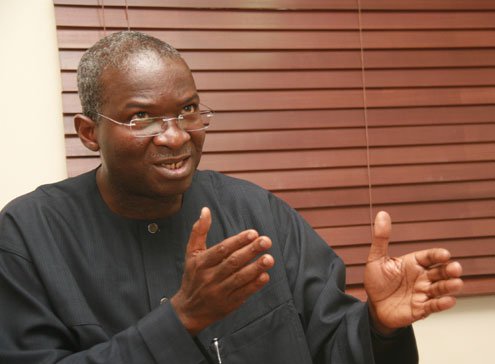This post has already been read 2392 times!
Ettu Mohammed
Nigerians were surprised to hear on Thursday the summary of the country’s power supply challenge from the Minister of Power, Works and Housing, Babatunde Fashola, that, “It is not FG’s problem if Nigerians lack electricity”. It was shocking because the statement did not acknowledge the true situation of things in the sector which is that the Federal Government has 40% stake in the Discos, Gencos and a 100% stake in the Transmission Company of Nigeria which is the major stumbling block in the power sector.
The problem is shared in a 60/40 ratio. Yes, the business men lead at the front but what about the government’s angle?
The consistent thing that has marked the last three years from the Ministry of Power, Works and Housing with regard to power supply has been false narratives.
On the other hand, one of the most important issues affecting the sector’s success – a cost-reflective tariff – gets almost no mention at all. How can the issues be fixed if we keep avoiding the major problem?
Perhaps, Fashola may have forgotten, but before the Power Holding Company of Nigeria was sold to its successor companies, followed by the devaluation of the naira, energy was sold for between N25 and N36/kWh, which is equivalent to 18.4¢/kWh. This value is at par with many countries on the planet.
The minister forgot to inform Nigerians that the power sector is 100% import-dependent, hence the devaluation had a devastating effect on the sector’s revenue expense-wise but nothing changed on the income side despite the devaluation.
Today, energy is sold for between N25 and N36/kWh which is now equivalent to 8.4¢/kWh. That is over 54% loss against a business which is 100% import dependent. How will they survive?
Agreed, the current licence holders may not be as technically savvy as Nigerians will prefer them to be, but this single adverse financial challenge is sufficient to kill any form of investment in any sector regardless of the technical competence of its operators. They will continually be engaged in a losing struggle to recoup their initial investment as well as pay off the debts they owe banks and other sources from where they got funds from.
The ministry has also not made concrete efforts to help check energy theft and by this, I am referring to sustainable and enforceable policies and not just cosmetic events that do not address the problem. While we expect the operators to adopt new systems and technologies to curb energy theft, as the representative of the government in the 60/40 relationship, I think they should be more interested in aligning government’s other institutions to help check this practice.
While Fashola’s prowess in law and jurisprudence may not be questioned, a critical sector like power needs a technical hand, preferably an electrical engineer. I believe this is the main reason why he has kept pushing a narrative of a phantom 2,000MW stranded power which is non-existent or an acclaimed accomplishment of 7,000 MW generation capacity whereas Nigeria already had the capacity to generate 6.2GW as of 2014 and yet we remain saddled with gas constraints and a weak wheeling network which has not improved substantially in the last four years.
As of 2013, Nigeria was wheeling 3,000MW-plus on the transmission grid. This is still the same average we are battling with in 2018. It is instructive and worrisome to say that Nigeria has NOT wheeled 4,000MW on average in our 58 years of existence. The one-off incident where we wheeled over 5,000MW on only one day does not count.
The data of the wheeled and generated energy since 2013 is available on the Nigerian Electricity Regulatory Commission’s website captioned as daily energy watch (the daily updates have been discontinued).
I enjoin the reader to find some relevant links listed below and data pulled from NERC’s “Daily Energy” watch which was discontinued by the regulatory body in January 2017. Also, in these links are the energy report for 2017 and Q1 of 2018; NNPC monthly report and TCN System Operators daily report from 2014. These reports contradict information the ministry has pushed to the Nigerian public in the last three years. I doubt that the minister can know more than the NERC.
- http://nerc.gov.ng/index.php/library/documents/NERC-Reports/NERC-Quarterly-Reports/NERC-First-Quarter-Report-2018/
2.http://nnpcgroup.com/NNPCBusiness/BusinessInformation/PerformanceData/MonthlyPerformanceData/tabid/617/FolderID/211/Default.aspx
- https://www.nsong.org/Library.aspx
Any other figure other than the statistics listed below is wrong and misleading.
- Nigeria as at 2013 was wheeling 3,292MW averagely that is 28,837,920MWh of Energy in 2013.
- Nigeria as at 2014 was wheeling 3,330MW averagely that is 29,170,800MWh of Energy in 2014
- Nigeria as at 2015 was wheeling 3,529MW averagely that is 30,914,040MWh of Energy in 2015
- Nigeria as at 2016 was wheeling 3,188MW averagely that is 27,926,880MWh of Energy in 2016
- Nigeria as at 2017 was wheeling 3,619MW averagely that is 31,702,440MWh of Energy in 2017
- Nigeria as at March 2018 wheeled 3,942MW averagely that is 28,514,720MWh which has since returned to the same position in 2014.
More importantly, the country’s electricity consumption per capita has dropped because it is recorded against our population.
Please note there are losses associated with Wheeling and Distribution and we also export electricity.
Also of interest is that the figures above are not what gets to Nigerians. There is at least eight per cent loss on wheeling and distribution and another 10% is exported to our neighbours leaving Nigerians to battle with less than 3,000MW. This is 58 years after independence.
Anyone who tells the minister that making power is rocket science is NOT okay.
All over Africa, nations are building power plants in record time and Egypt just unveiled a 14.4GW plant in 27.5 months for less than $6.5bn.
- Mohammed, an energy analyst, wrote in from Lagos
[Punch]



